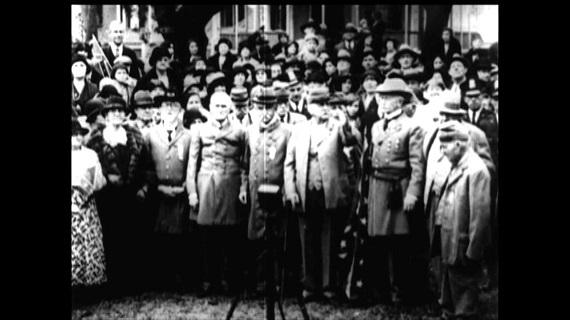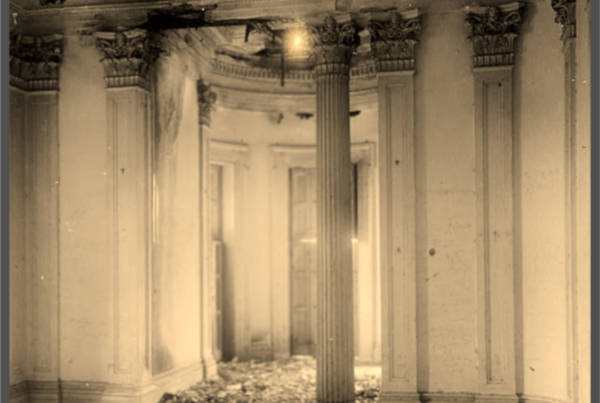Recently, a friend sent me a link on the Smithsonian web site to a 1930 video clip with good sonics of some aged Confederate veterans demonstrating how the famous “Rebel Yell” had sounded some 65 years earlier. All those men were at least in their late 80s, most in their 90s. But their remarkable spirit still showed through.
History and time can play tricks on us. As a boy I can remember, if vaguely, when the last Confederate and Union veterans passed away. More recently, I can recall when the last Confederate widow “crossed over the Jordan into Promised Land.” My grandfather (1880-1962) on my mother’s side vividly recounted to me in 1960 how he stood as a young apprentice in respectful silence when the Jefferson Davis funeral procession went up Fayetteville Street in Raleigh back in 1893, before continuing on to Richmond. On my father’s side, my grandmother was born in 1865, and lived until 1962. I recall her telling me that as a girl she remembered an old gentlemen in Mecklenburg County, North Carolina, who was then 100 years old, who was born before the Revolution, and who remembered George Washington’s “Southern Tour” stop in Charlotte in 1791!
Our ancestors are ever present in our memory, as long as we have not abandoned or forsaken it or them. They remind us, as the late Mel Bradford once wrote, of who we are, or, at the least, who we have been. They offer high standards of conduct, indeed—standards that, alas, too many in the post-World War II and post-Vietnam generations have rejected, either implicitly, or more callously, explicitly.
Unlike the centennial of the War Between the States fifty years ago, the observances for the sesquicentennial seem less palpable to many of our fellow citizens…we cannot spend too much time commemorating, you see, as we might miss the latest installment of “Survivor” or “America’s Got Talent.” Our schools, media, and pusillanimous political class encourage historical amnesia, that is, except as long as Martin Luther King, Rosa Parks, Malcolm X, and the freeing of the slaves (you know, “what Lincoln did”) remain central to the remaining and terribly mangled historical American narrative.
In 2015, the “remembered past” seems too often to intrude on our petty concerns and small-minded lives of angst and boredom. Many of our fellow citizens, when not creating and accepting a made-up politically-correct “past,” just simply ignore it, since it gets in the way.
And concomitant with this process, parallel to it, we witness the wallowing in defecation of what is left of a once proud nation. “America is a great nation, an exceptional nation,” to hear a Rush Limbaugh bellow forth with his bombast, or a Glenn Beck with his heretical mix of religion and skewed politics. “Exceptional,” you say? “Exceptionally off its hinges,” I would respond. “Exceptionally engulfed in a ‘culture of pornographic filth’ and aborted death,” I would reply. “Exceptionally intrusive in imposing all our evils on the rest of the world, whether they wish them or not,” I would retort.
Certainly, there are those men and women, those good families, who remain steadfast, who hold high the banners of sanity and Faith that they have received from their fathers and ancestors, but that number is dwindling, not increasing. And those who dominate this decrepit nation, who run its politics, who conduct its foreign policy, who dictate rules and regulations from their managerial offices in Washington (or in Raleigh, Atlanta, or Columbia), are the faceless bureaucrats, the automatons, the cogs in the onrushing triumphant tide that represents the antithesis of what our ancestors believed, and what we, too, still hold paramount.
As I viewed the short video of those veterans, I recalled the sacrifice of our ancestors, their deprivations, their valiant fight for the beliefs and principles they held dear, so dear indeed that they left their homes, farms and families to go off to suffer mightily for four years, many never to return.
Once again, today, the call must go out for us to renew their struggle. This weary nation, eaten away by cancerous and alien philosophies—feminism, same sex ideology, egalitarianism, pseudo-“civil rights”, “liberal democracy,” statist centralization, and so on—will not survive as we have known it. With the millions of illiterate illegals that both Obama and the GOP, at the behest of the Chamber of Commerce and big business, are letting in (you know, those future “bloc voters” who will take their places on the same modern, Leftist plantation where most blacks now reside), the almost total corruption of our colleges and educational system, the utter evil of the entertainment industry, and the collapse of most real opposition to the rampant radicalism—with these contagions continuing to gnaw away at an even more rapid pace, we must be prepared for the final end of this “exceptional American experiment,” we must survive, even in the catacombs, to re-emerge when the weakened walls finally come tumbling down….and pick up the pieces, methodically separating our communities, our respective states, from the worst corruption and infection.
A century ago the pro-Confederate poet, Robert Lee Frost, in his poem, “The Black Cottage,” wrote about the truths that seemingly fall out of favor, only to re-emerge to inspire us and inform our long-term objectives:
For, dear me, why abandon a belief
Merely because it ceases to be true.
Cling to it long enough, and not a doubt
It will turn true again, for so it goes.
Most of the change we think we see in life
Is due to truths being in and out of favour.
As I sit here, and oftentimes, I wish
I could be monarch of a desert land
I could devote and dedicate forever
To the truths we keep coming back and back to.
In the decaying America of 2015, at times it seems that the truths our ancestors so valiantly defended have disappeared, consigned to museums, banned, or declared “politically-incorrect.” But as Frost advises, they are not really gone; if we cling to them long enough and maintain them fearlessly–yes, even in the catacombs–they will re-emerge. Then shall we raise up once more the flags of our ancestors, the flags they fought and died for, and those flags shall fly proudly, representing our dedication to the traditions that once again shall flourish and give rebirth to our culture.







